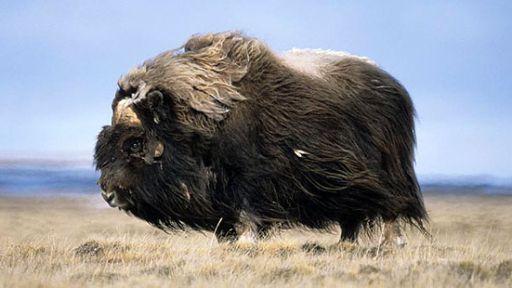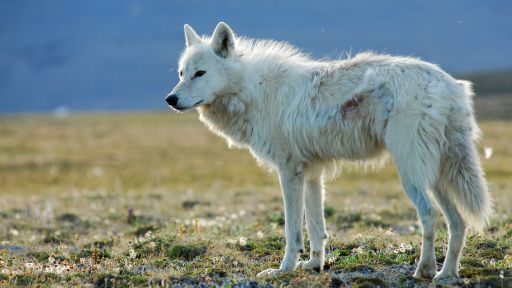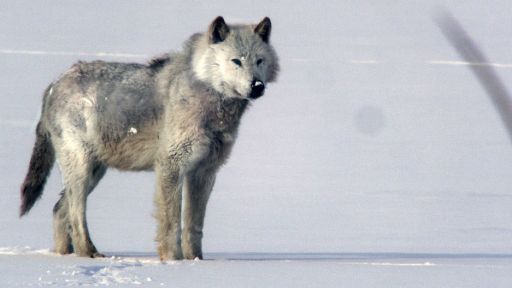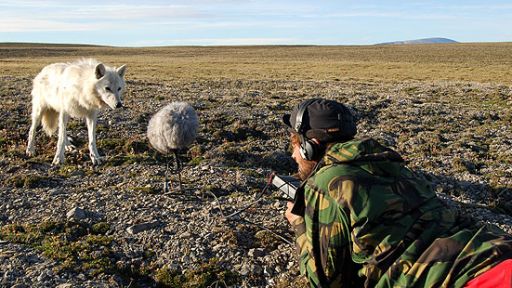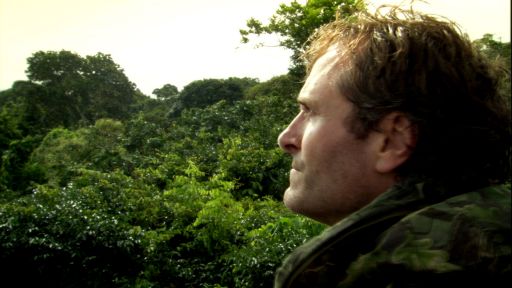We had a little rain overnight; more of our 6cm annual quota.
It still seems quite bizarre to me to have rain in this land where I’m normally struggling to get comfortable due to the intense cold.
The snow on the mountains is really getting thin, revealing a vista of grey and brown rocks. These mountains are very young, geologically speaking, and absolutely fascinating just to look and stare at. Fault lines, erosion on a vast scale, massive valleys caused by glaciers, and deep river gorges still being gouged out of the rock — all the ingredients of basic school geography to wonder at.
The wolves left the den to go off hunting (we assumed) and didn’t return for some 15 hours. This caused us some concern.
Had we scared them off? “H” was very worried and stayed up all night to watch for their return. Twenty-four-hour sunlight was very useful in that it provided continual visibility; unless of course the weather came down.
Just before I awoke at 0600 hrs, the wolves returned and were sleeping like warn-out pet dogs on the hill top above the den.
Camp preparations
The den, I should explain, was about 10m up a fairly loose and flaky riverbank with two enormous boulders situated about two-thirds of the way up.
The one that stuck out most didn’t seem to be used and the other, which looked flatter, had piles of trodden down excavations all around it and more than one entrance hole.
From our camp 1.8km away you can count eight different holes so there must be a labyrinth of caves and tunnels underneath.
Research carried out on a den site further north indicated that the dens were re-used again and again over as much as a 700-year period. (It’s good here, with all the paper research and the knowledge that the crew has; I’m becoming a little wolf “expert” in my own right — well relatively speaking anyway).
The logistics were going really well. Because we found a den so soon and much further south than the known den, we’ve managed to save quite a bit of the budget and so can utilise some of that in servicing this site properly.
I’ve planned for a helicopter to come up from Yellowknife and bring Jonny and Mark (producer and cameraman) in very close to our base camp; and en route they’ll be able to take some aerial shots of Devon and Ellesmere Islands.
The helicopter will drop them off and then travel to the airstrip where I’ve arranged for the remainder of the equipment and provisions to be landed and cached by the crew of a twin otter aircraft.
Lots of lemmings
I’ll get the helicopter pilot to under-sling this stuff and fly it the 10km to base camp (probably three journeys in all) and then fly west up the beach to pick up the remainder of our first camp; all should run like clockwork but it’ll be a long day.
During the next few days, whilst we were waiting for the rest of the crew to arrive, “H” spent most of the time carefully noting every movement of the wolves; and when he wasn’t doing that he was wandering in the local vicinity finding other wildlife gems that would add to the story.
We were building quite a collection: the snowy owls nest that we came upon earlier; a snow buntings nest just yards from our camp in the crumbling mud of the river bank; a Jaeger’s nest found on our route to the beach some 500m away; and of course the lemmings. Wow!
There are thousands of dear little brown lemmings (their coats turn white in winter) scattered all over the bog. It seems they dig their burrows when the bog is really wet and sit there waiting and willing for it to dry out! (I know the feeling!).
Meanwhile I was exploring on a daily basis, gently pushing the boundaries of our immediate situation and adding to the knowledge of our whereabouts – one day north, the next west; and so on.
This was incredible fun. I felt like Huckleberry Finn, stripping off naked on a daily basis and washing in the pure clean melt-water of the river and then deciding what amazing adventure I’d get up to today.
I had a feeling that things might change somewhat when the crew arrived, however, and the real work would start.

